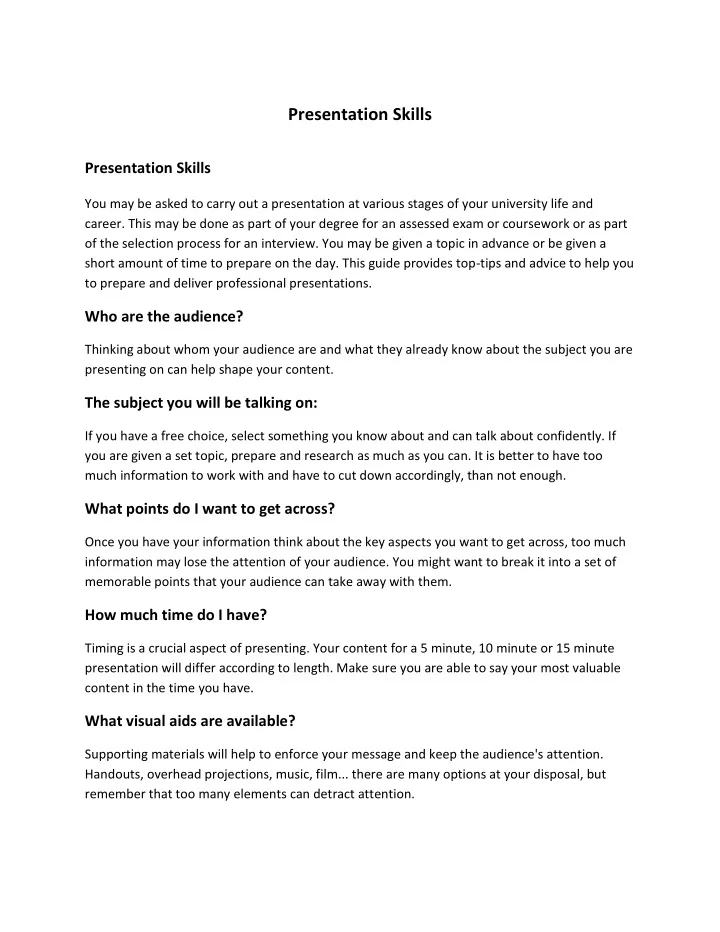

Presentation Skills Presentation Skills You may be asked to carry out a presentation at various stages of your university life and career. This may be done as part of your degree for an assessed exam or coursework or as part of the selection process for an interview. You may be given a topic in advance or be given a short amount of time to prepare on the day. This guide provides top-tips and advice to help you to prepare and deliver professional presentations. Who are the audience? Thinking about whom your audience are and what they already know about the subject you are presenting on can help shape your content. The subject you will be talking on: If you have a free choice, select something you know about and can talk about confidently. If you are given a set topic, prepare and research as much as you can. It is better to have too much information to work with and have to cut down accordingly, than not enough. What points do I want to get across? Once you have your information think about the key aspects you want to get across, too much information may lose the attention of your audience. You might want to break it into a set of memorable points that your audience can take away with them. How much time do I have? Timing is a crucial aspect of presenting. Your content for a 5 minute, 10 minute or 15 minute presentation will differ according to length. Make sure you are able to say your most valuable content in the time you have. What visual aids are available? Supporting materials will help to enforce your message and keep the audience's attention. Handouts, overhead projections, music, film... there are many options at your disposal, but remember that too many elements can detract attention.
Structuring your presentation Presentations need to be straightforward and logical, helping your audience understand your ideas and follow the information you are delivering. It is important that you avoid complex structures and focus on explaining and discussing your work clearly. Like an essay, your presentation should have a clear beginning, middle and end. The Introduction Introduce yourself and the topic indicating how long you are going to speak for. Outline your key themes. Say when you would like to take questions. For example, Q&A section at end. The main body Most topics have a logical order. Try to link your presentation with a natural flow of context as you would for an essay. If presenting an argument, first give points in favour and secondly, against. If possible and appropriate, use narrative – people respond to stories, anecdotes, examples, case histories, charts or graphs. The conclusion Inform the audience you are near the end so that they give you their full attention as you sum up. E.g ‘and now to conclude’ Summaries key points and do not add anything new. Thank the audience for listening. If not included anywhere else in presentation, open up the possibility of question and answer. For a 10 minute presentation on "What makes you the right candidate for this position" the following may be a good indicator of timings:
30 seconds: What you are going to tell your audience throughout the presentation. 1 minute: On the organization, industry or current market. For example media presence, competitors and potential areas for growth. 2 minutes: On the skills needed for the particular role. Use a copy of the person specification and think about the responsibilities within the role as a good starting point. 3 minutes: On evidence showing you have these skills. Think about your previous work experience, voluntary roles, extracurricular or sporting activities for inspiration as how you have developed the skills needed for the role. 1.5 minutes: Summary of your key points. 2 minutes: Question and Answer Top Tips: Nerves! It is completely normal to feel nervous. Many experienced and professional public speakers feel nervous before presenting. Nerves can even be positive as the adrenaline can increase your sharpness during the performance. Practice! Practicing your presentation can be the best way to slowly reduce nervousness before the event. Speaking aloud is very different from reading in your head. Why not practice to a friend, family member, colleague or discuss your presentation with one of the Careers Consultants here in the service. Notes and Handouts Having notes can be a comfort in a presentation in case you forget your key points. Handouts are also something valuable to give to your audience so they can follow your presentation on paper as well as make notes accordingly. Remember
There is no such thing as a perfect presentation. Afterwards, acknowledge those parts that you did well and give yourself some praise; only then should you consider the rest and reflect on how you could improve the next time. The more you practice the faster you will develop your own style.
Recommend
More recommend